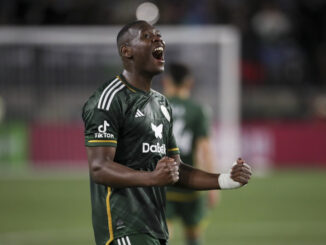
Anyone that had the pleasure of watching the Portland Timbers home-and-away tie with Sporting KC in the MLS Cup Semi Final couldn’t deny the special brand of excitement that only soccer matches seem to bring.
If you didn’t see Sebastian Blanco’s game-tying goal in the 52nd minute of the game in Kansas City, make sure you watch it right now .
As priceless and otherworldly as the goal itself was, El Maestro’s (Diego Valeri’s) reaction to the goal, which you can also see in the clip, was equally moving. This is why we watch sports: to witness a professional athlete overcome with awe and emotion, even if for only a few seconds, at his teammate’s magic.
While we continue to be a nation obsessed with American Football, it’s remarkable and noteworthy that the Pacific Northwest continues to avidly devote itself to its MLS teams, as has been the standard in European and South American nations for well over a hundred years. While I don’t claim to be an obsessive Timbers fan, I was so moved by this game, specifically this goal, that I picked up Laurent Dubois’ 2018 publication The Language of the Game (Basic Books).
Dubois is a professor of romance studies and history at Duke University and teaches an annual course on soccer politics. This course, along with his groundbreaking 2010 book Soccer Empire that explores the history of French soccer, has earned Dubois a big standing in the cross-section of global, political sports writing. Dubois writes intermittently for magazines and blogs as well (Sports Illustrated; Goal Posts; Slate).
While I was disappointed at the remedial nature of a great deal of this book (written in part for an audience entirely unfamiliar with soccer rules or even positions), the book redeems itself with Dubois’ tireless unveiling of important moments in soccer history, alongside a wide-ranging reservoir of movies, films, and texts that Dubois draws on to bolster his points.
His tangents into the world of these soccer books and movies were, undoubtedly, my favorite moments of his book. Additionally, Dubois’ interest in history and politics shines through; the important historical moments he brings to light are, in turn, political ones. Essentially, the amount of cultural references Dubois invokes is astounding for a popular sports book.
Likewise, Dubois blessedly spends a great deal of time discussing women’s soccer and devotes far more attention to Lloyd, Rapinoe, Wambach and Solo than any US Men’s National Team players. This is fitting, given the disparity in success among the two national teams.
Importantly, Dubois also correlates the history of female soccer to the yearning after equal rights, in a variety of cultures. He outlines intelligently and meaningfully the emergence of women’s soccer in England as a result of WWI (with the male players away at war, the Dick, Kerr Ladies team became internationally famous, attracting extremely large crowds), and likewise doesn’t shy away from investigating the historically unabashed attempts of soccer’s governing bodies, FIFA and IFAB, to systematically oppress women’s soccer, and how that continues today (primarily in pay disparity).
FIFA’s unwillingness to allow Muslim women to wear hijabs is explored, as well as the backwards policies of nations like Iran disallowing women from even attending soccer events. The film Offside, by Iranian director Jafar Panahi, which depicts Iranian hostility toward women in regards to soccer, is celebrated, and in doing so Dubois, ideally, opens American soccer fans’ eyes to these injustices. There are many more historical, socio-political anecdotes throughout The Language of the Game that could demand book-length explorations themselves.
For literary fans, Dubois, likewise, calls on Aleksandar Hemon, Karl Ove Knausgaard, Nick Hornby, and, most notably, Eduardo Galeano, repeatedly referencing Galeano’s Soccer in Sun and Shadow, considered by many the most beautiful book ever written about “The Beautiful Game.” In addition, Dubois invokes historical and literary academic scholars. There is no shortage, essentially, to Dubois’s depth of resources.
If it’s not clear yet, the deep referential aspect of The Language of the Game is clearly what makes it worthwhile. However, this also makes one wonder why Dubois repeatedly dumbs the book down to the level of, hypothetically, a raw initiate to the game. It is a strange unbalance, perhaps a result of Dubois wanting to reach an American audience largely still uninterested in the world’s most popular sport.
Whatever the reason, one cannot argue with Dubois’ sincere love of the game; he is a fan first and foremost and has attended international matches, including World Cup matches, all over the globe. While his French heritage persuades him to devote a great deal of attention to French players and the French national team, he admits, transparently, that his allegiances are multi-faceted; his favorite play is the one that is the most beautiful, and he describes many of these plays throughout The Language of the Game.
Finally, toward the close of the book, Dubois even asks what it means to be a sports fan. What do sports offer humans in a terribly broken world? This is a difficult question to answer, and Dubois points toward beauty, solace, and the unexpected as answers. While again flirting with elementary exposition, the question remains a refreshing one; an important one that most popular sports books fail to ask.
In the end, despite its shortcomings, Dubois’ book is a pleasing read to get us excited for the MLS Cup Final (and, for those of us in the Northwest, a possible second Timbers championship!). It is a love letter to the beautiful game, and its historical and socio-political underpinnings, its occasional philosophical ponderings, and primarily the large reservoir of films, books and texts it calls on offers readers a bountiful future in the beautiful game.




